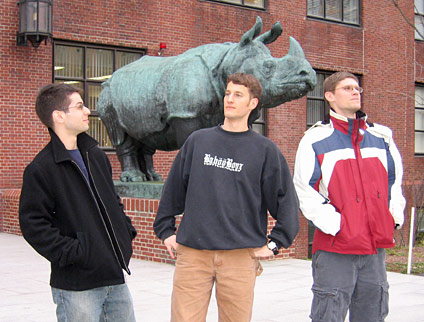Awards Recipients (l to r): Martin Samuels, Martin Willensdorfer and Erik Procko
Three MCB graduate students were recognized for their academic achievement at MCB’s retreat at Loon Mountain in New Hampshire last month. This year’s Merck-Wiley Fellowship recipients were Erik Procko and Martin Willensdorfer, and Martin Samuels was awarded the Peralta Prize.
Merck-Wiley Fellowships
Erik Procko of the Gaudet lab, MCB, and Martin Willensdorfer, Nowak lab in OEB, have been awarded the 2006-7 Merck-Wiley Fellowship. Funded by Merck in memory of Dr. Don Wiley of MCB, the Merck-Wiley Fellowship annually recognizes academic distinction of two graduate students entering their fourth year, providing each with stipend support for two years and a one-time personal award of $1500.
Martin Willensdorfer’s research focuses on the evolutionary advent of multicellular life: “I derive and analyse mathematical equations that capture the main aspects of this transition [from single-cell life forms]. Additionally, I reenact the evolution of multicellularity in artificial life simulations to get an idea of how such a transition might have occurred. The award announcement notes: “his creativity, his accuracy, and his originality in developing models to advance debated questions have resulted in a milestone paper on sympatric speciation.” (See Burger et al., 2006. “Why are phenotypic mutation rates much higher than genotypic mutation rates?” Genetics 172: 197-206).
In addition, Willensdorfer “is valued for his humor, his friendship, his originality. He is held in the highest esteem as a student, teacher, scientist, and colleague.” Department Chair, Dr. Andrew Murray, adds “I think that Don Wiley would have been attracted to a student who has shown as much independence, initiative, and creativity as Martin.” Before coming to MCB, Willensdorfer graduated from the University of Vienna and holds M.Sc. degrees in genetics and mathematics from the Vienna University of Technology.
For Erik Procko, the focus is on determining the structure of TAP, the transporter associated with antigen processing. TAP, he explains, “uses the energy from ATP binding and hydrolysis to shuttle short cytosolic peptides into the endoplasmic reticulum, where the peptides are loaded onto class I MHC molecules for immune surveillance. Using a combination of x-ray crystallography and biochemical assays, [I aim] to address how ATP hydrolysis is coupled to peptide transport and how TAP selects its peptide substrates.”
A former winner of MCB’s Peralta Prize, Procko graduated the University of Adelaide in Australia. He is praised by his dissertation committee for critical abilities as well as his laboratory skills, his production of “clear and controlled data” and his ability to rethink his approaches when the data is surprising. (For confirmation of their view, see, e.g., Procko et al., 2006. “Distinct structural and functional properties of the ATPase sites in an asymmetric ABC transporter.” Molecular Cell 24:51-62.) Procko is also commended as a gifted teacher and fine citizen of the Department. Dr. Stephen Harrison, a close colleague of the late Dr. Wiley noted “Don Wiley would have hugely appreciated Erik, not only for his outstanding scientific talents, but also for his touch of polite, yet self-confident Australian insouciance.”
In Erik Procko and Martin Willensdorfer, the 2006-7 Merck-Wiley Fellowship program has recognized two outstanding scientists and two notable contributors to the Life Sciences community.
Peralta Prize
The 2006-7 academic year Peralta Prize has been awarded to Martin Samuels, graduate student in the Jeruzalmi lab in MCB. The $2500 annual prize is given to a third year graduate student in memory of Dr. Ernest Peralta, faculty member in MCB, whose death in 1999 cut short an already distinguished career in its ascent. Mr. Samuels was judged by the MCB Graduate Committee as having the “best defense performance and dissertation proposal arising from the [second year graduate student] candidacy examination requirement.” In fact, Dr. Gregory Verdine attests, “He gave the most impressive performance at a candidacy exam that I have ever seen.”
Mr. Samuels studies a key aspect of DNA replication. “[I] explore the relationship between the structure and function of two proteins required for the initiation of bacterial chromosomal DNA replication, DnaB and DnaC. DnaB is the chromosomal replicative helicase and as such is a molecular motor that processes along a DNA duplex and simultaneously unwinds it, and is thought to do so as a homohexamer. Neither it, nor its regulator/loading partner DnaC, have well understood mechanisms of action.”
The awarding statement notes that in addition to his scientific acumen and his professionalism, Mr. Samuels, a University of Chicago graduate, “is valued as a selfless colleague who stands up for what is right, an avid sports fan who throws great parties, and a keen reader in many different subjects.” Those in MCB who recall Dr. Peralta, an outstanding, engaging colleague (and one-time back-up quarterback for Northwestern) will recognize how fitting Mr. Samuels’ selection is in that regard. Dr. Matthew Michael adds: “He is exactly the sort of student that this department hopes for when we hand out acceptance letters.”
Mr. Samuels will be provided $1500 in travel funds and an additional $1000 for unrestricted personal use.


